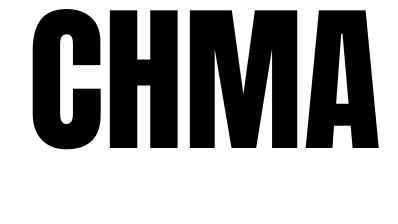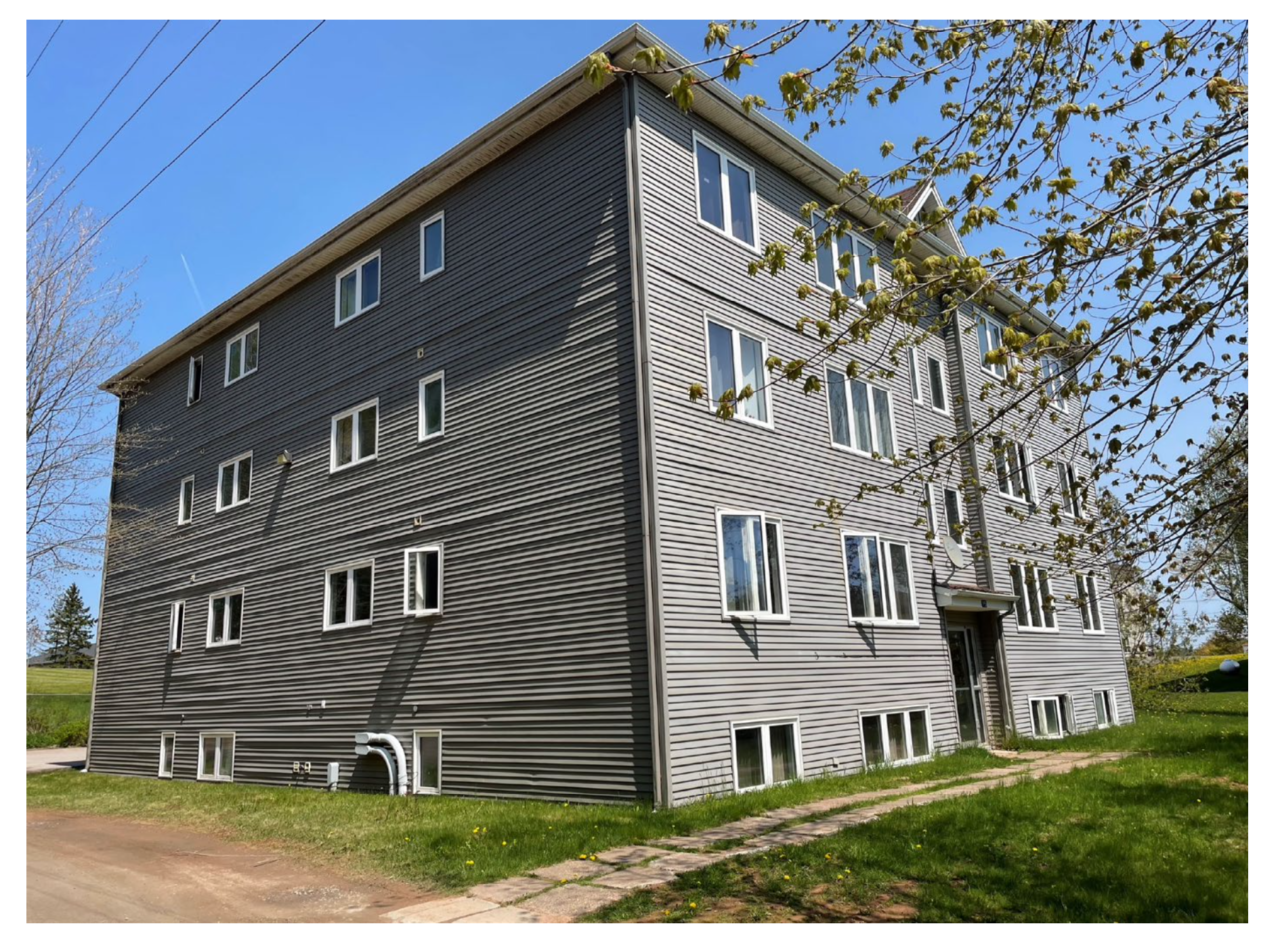
A number of Sackville households are looking for new rental housing after a 16-unit apartment building on King Street in Sackville was purchased by an investment group.
Sunset Investments GP took ownership of 15 King Street at the end of June, and tenants in the building report receiving letters announcing the termination of their leases on Canada Day, July 1, 2022.
Tenants were offered “furnishing credits” along with their lease terminations, a payment designed to help them cover costs associated with finding a new place to live. But at least one tenant says they’d rather keep their home than have the payout.
According to reports on social media from those looking for rental housing, the market in Sackville is very tight, with almost no large units available for families. A King Street tenant who asked not to be named says losing their lease likely means moving out of Sackville, which was not in their plan.
“We don’t want to leave the town,” they told CHMA. “I mean, our life is here.”
Tenants who had a one year lease at 15 King Street have been given three months notice, as per the law in New Brunswick. That means apartments must be vacated by October 1, 2022. Others on month to month leases are required to receive just one month notice, and so some may have to leave by the end of July.
Jael Duarte, a tenants’ rights advocate for the New Brunswick Tenants Rights Coalition, says that property owners can terminate leases on the grounds that they need apartments empty for renovations to take place. The plan for those renovations needs to be approved by the Residential Tenancies Tribunal in order to prevent bogus claims of renovations for the sake of getting rid of tenants, a practice known as ‘renoviction’.
“The landlord has to apply to the Tribunal to be allowed to terminate the contract,” says Duarte. “That is how it works with the new legislation.” But the legislation is so new that there are currently no guidelines on what constitutes a ‘big enough’ renovation.
Duarte also says if a landlord doesn’t follow through on renovation plans within 2 months, they could be liable to pay compensation to that tenant.
Introducing BRRRRing
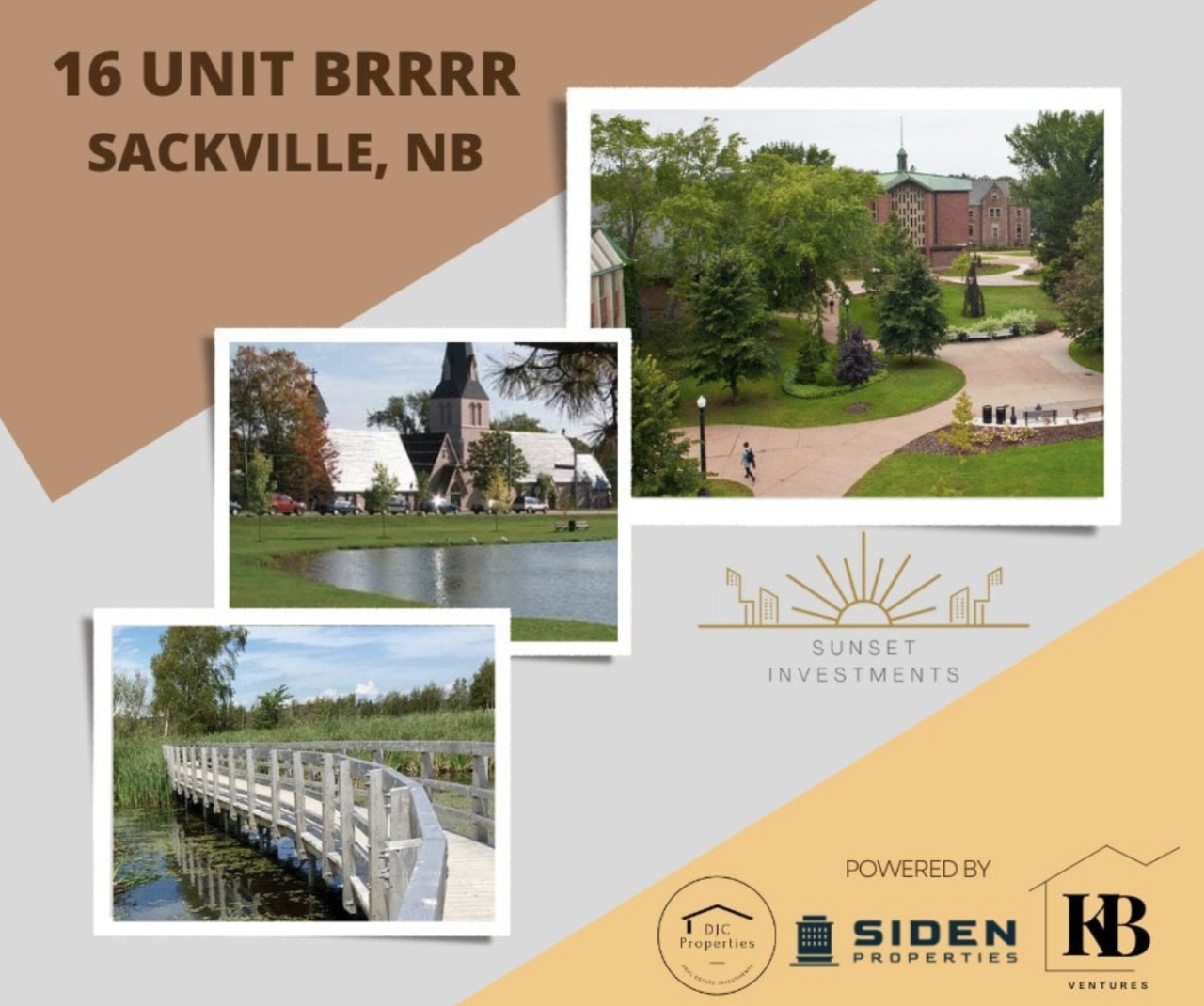
Hermel Godbout is part of the investor group that bought 15 King. He spoke to CHMA for this story, but declined to comment on record due to concerns he would be quoted out of context or misinterpreted.
According to online advertising, Sunset Investments plans to use a “BRRRR” strategy to turn a profit on 15 King Street. BRRRR is an acronym for buy, renovate, rent, refinance, and repeat. It’s a relatively new practice, says sociologist Matthew Hayes, one that has been made possible by changes to banking laws, and popularized by American real estate investment company turned how-to empire, Bigger Pockets.
The idea is to buy a building and immediately renovate it to increase its rental income. That all sounds fairly commonplace, but with a BRRRR strategy there’s two more steps: refinance and repeat. The increased rental income pays off two ways for investors, first, in the increased income coming into the property. And second, in the higher market value of the property.
“Increasing the rents obviously has a huge impact on tenants,” says Hayes, “but for the owners, increasing the rent increases the value of the property, and that’s why they do it. It’s not just about increasing the rents, it’s about being able to refinance the building.”
In the investor recruitment presentation distributed by Sunset Investments, Godbout and his partners predict that investors would get 71% of their investment back in just one year due mainly to what they call “forced appreciation.”
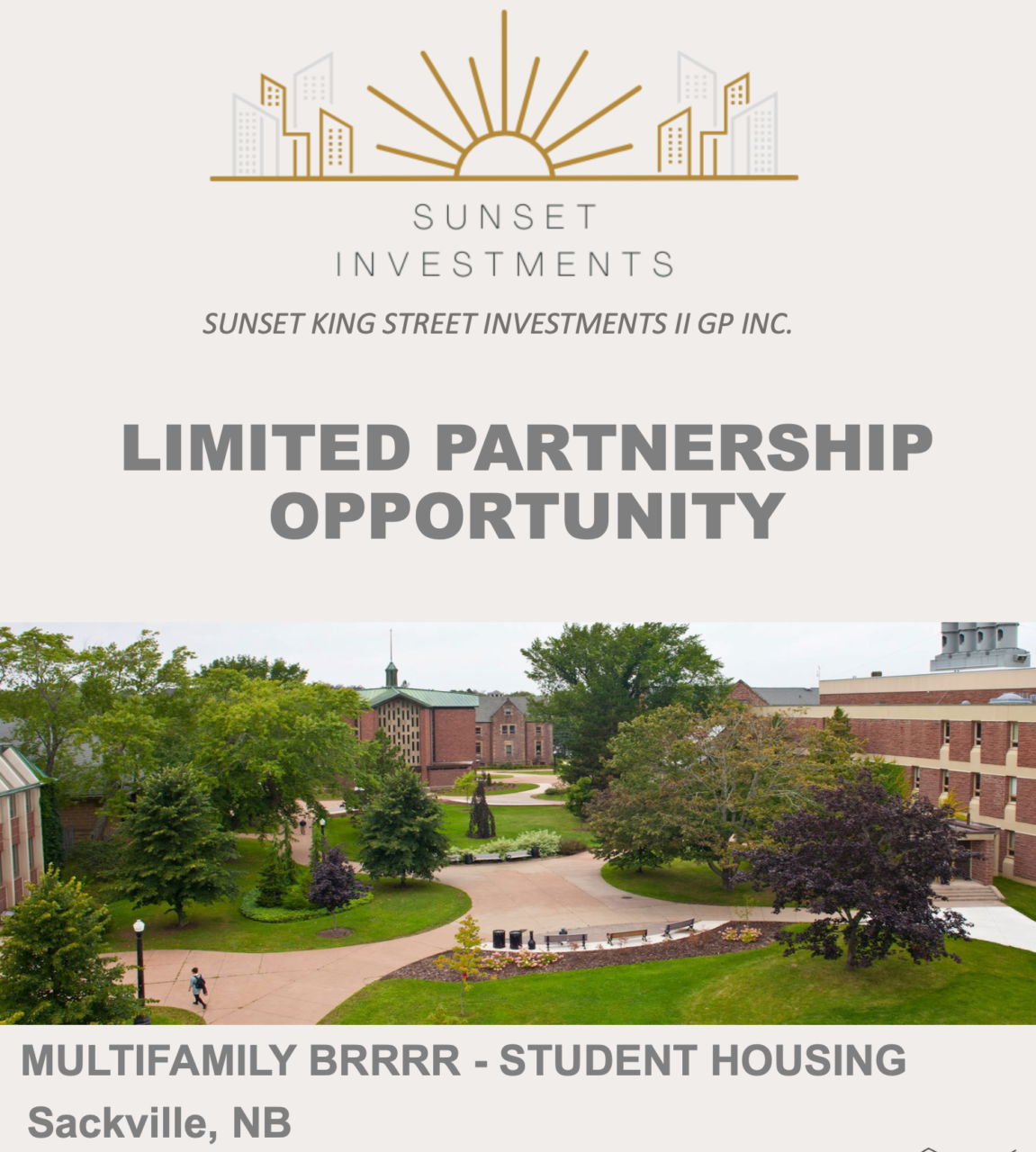
They plan to achieve that at 15 King Street by turning all 15 of the two-bedroom units into three-bedroom units by removing shared living space, effectively converting them to student-focussed housing.
In their presentation, Sunset predicts the 15 added bedrooms will mean an additional $450 in rent per unit per month, translating to an extra $81,000 in annual rental income. That in turn, according to Sunset’s presentation, translates to an extra $1.4 million in “value creation.” The company can then refinance, borrowing against that created value, and pay off a good part of their initial investment.
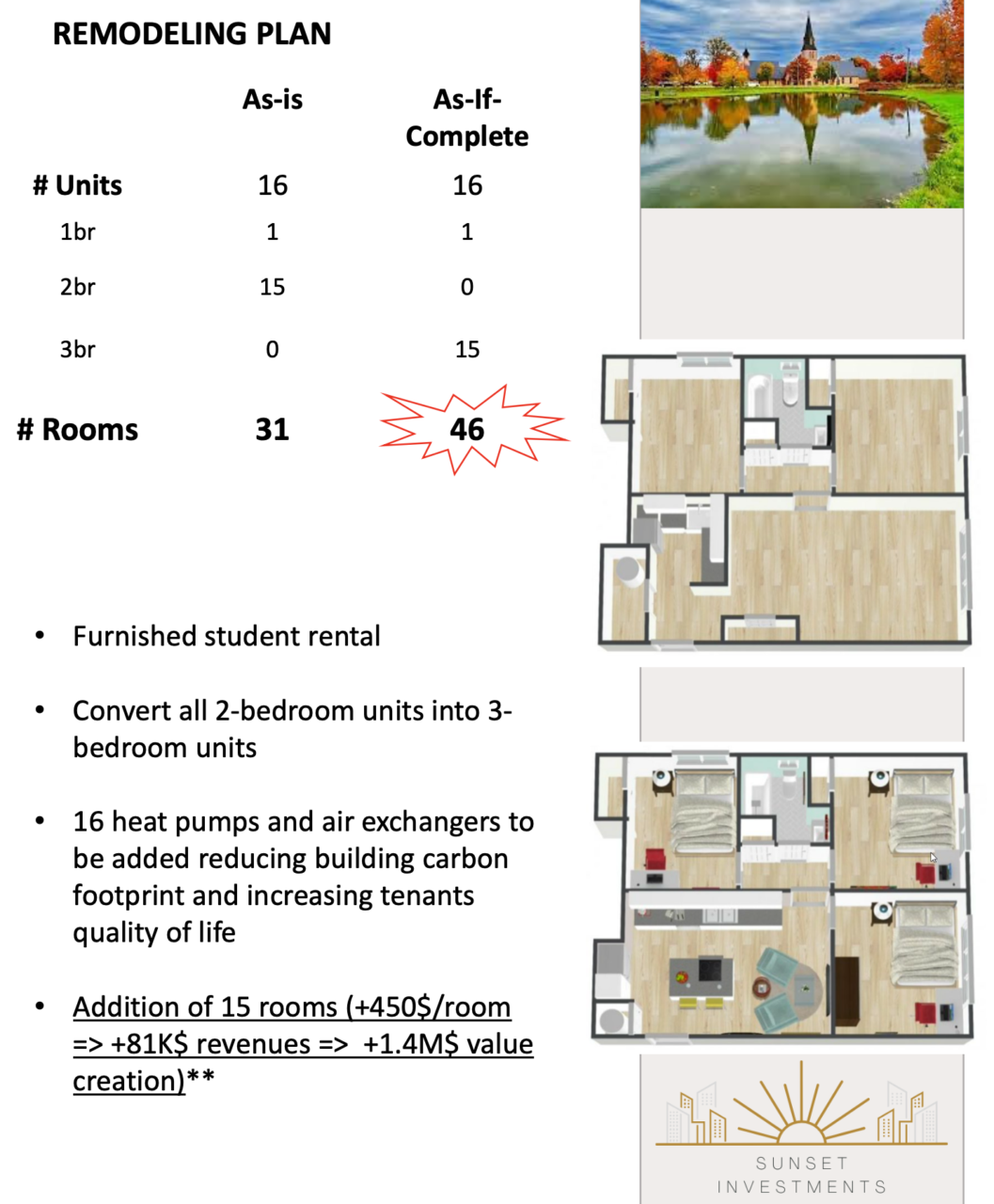
The ‘value creation’, or ‘forced appreciation’, is a big part of the payoff for BRRRR style investing. And when so much of an investment is recouped early, that opens up the opportunity for the final R in BRRRR: repeat.
“They’re taking out as much or more than they put in,” explains Hayes, speaking generally about BRRRR style investors. “And then that money goes hunting for more buildings to do the same.”
‘All kinds of risks, especially for tenants’
The practice might just be getting started in New Brunswick cities and towns. “The process has run out of steam in markets like Toronto,” says Hayes. “All of the buildings that could have had additional wealth extracted from them, it’s been done. There are very few buildings or houses left that you can do this with. The cream basically is now in places like New Brunswick, Prince Edward Island, Newfoundland and Nova Scotia. Places that have been ignored by the market during its growth phase in the 2010s.”
Sunset’s presentation claims they have already purchased other buildings in New Brunswick, and the process in play at 15 King Street could be replayed in other Sackville buildings. The town’s low vacancy rate and high demand for housing (bolstered by the student population) makes it an ideal place for BRRRRing. Because BRRRR investors tend to target buildings where they see income potential, all affordable housing stock in Sackville is a potential target.
“Where this has happened in the United States, there have been all kinds of problems with it,” says Hayes. “From arbitrary evictions, rent increases, bad service for repairs and whatnot, renovations that have been done cheaply… There are all kinds of risks, especially for tenants. And some of these risks might also be borne by investors.”
Hayes says “weak landlord tenant legislation,” makes things worse for renters in New Brunswick. “The risks are really on the renting public, or the public that will rent in the future,” says Hayes.
Hayes points out that in the case 15 King Street, the project is technically adding more housing in the form of density, which “doesn’t seem necessarily like an objectionable thing. But [investors] are doing this all across the province. And they’re going to find all of the properties, basically, where they can increase the revenue by maybe adding a unit, or maybe just increasing the rents.”
BRRRRRing contributes to inflation
There is reason to be concerned about the pattern of BRRRR investing, even if you are not one of the households that receives a termination of lease, says Hayes. The phenomenon not only contributes to increased rental prices, but also inflates market values on properties, and thereby the dollar value of mortgages and loans on properties. And that means more money in the money supply.
“Banks are printing money all the time. Real estate investment trusts print money all the time by doing this, and no one is protesting,” says Hayes, a reference to public criticism of the federal government’s deficit spending, which is considered inflationary.
BRRRRing, along with other types of real estate investment practices currently en vogue, is “one of the things that’s causing inflation in Canada,” says Hayes.
Even before the Sunset group took over ownership at 15 King, the price of the building had inflated to more than double what it has been just 4 and a half years before.
According to Service New Brunswick’s property assessment online database, the building sold for $800,000 in December 2018. But then this year when Sunset acquired the property, the price was $1.8 million. That’s a $1 million appreciation in just four and half years. Hayes says this is in part due to investor-class landlords calculating value differently than traditional landlords.
From traditional landlords to passive income investors
Where a traditional landlord might expect to make 7% per year on a building, investors who are looking for ways to generate passive income can afford to make less, sometimes up to half as much.
Hayes says that new calculation leads real estate investment companies to inflate existing building prices, buying them for more than what traditional landlords might have thought they were worth. The end results is increased property values (and higher tax bills) in general, and an increase in the money supply, as banks refinance at higher values.
In the case of 15 King, Sunset bought a property for $1 million more than its last sale price, and then plans to add another $1.4 million in “value creation”. As Hayes pointed out, there are renovations happening, and the company plans to spend $800,000 on the roof, plumbing, and conversion of apartments to three bedrooms units.
That brings us back to the tenants currently living at 15 King who are now in search of new rental housing. The BRRRR investment pattern, along with other real estate investment practices, are in effect raising rents in Sackville. Schemes designed to give people with excess savings some passive income, says Hayes, end up increasing costs of those without enough savings to buy homes, which is a growing number of people.
Those who got, gets
It’s a version of ‘those who got, gets’, but with houses.
People in high income social groups will get higher returns on their savings, says Hayes, and on the flip side those limited to renting their homes will pay more in rent. He calls it a “big transfer of money” from working people without a lot of savings to wealthier people with excess savings.
And it is big. In New Brunswick, 17.1% of housing is owned by investors, or people who own multiple homes. When it comes to new housing, that share goes up to 41%.
There are policy changes that led to housing becoming an investment tool, says Hayes, especially in banking and housing at the federal level. And he believes rules can help fix it.
There were rules in place prior to the 1980s,” says Hayes. “The firms that bought and sold mortgages, specialized in that. They were not commercial banks. The commercial banks were separated from firms that sold securities. Now, all of that is kind of stuck together in some large corporations.”
“Certainly, there’s a need for regulation,” says Hayes, “that would be preserve access to housing for regular working people.”
